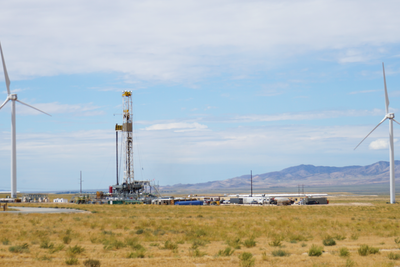geothermal predictions
Fervo Energy spotlighted by Bill Gates as geothermal’s global growth driver

Bill Gates says companies like Fervo push the geothermal technology 'to new depths.' Photo via fervoenergy.com
In a new blog post spotlighting Houston-based geothermal power startup Fervo Energy, billionaire Bill Gates — a Fervo investor — predicts geothermal will eventually supply up to 20 percent of the world’s electricity, up from his previous estimate of as much as 5 percent.
Today, geothermal accounts for less than 1 percent of electricity generated around the world, according to the International Energy Agency. The agency forecasts geothermal will represent up to 15 percent of global power by 2050.
“Geothermal power will have a big role to play in our clean energy future, and it’s exciting to see companies like Fervo push the technology to new depths,” Gates wrote.
Gates’ more than $1 billion Breakthrough Energy Ventures fund has contributed to the $982 million pool of money that Fervo has raised since its founding in 2017. Fervo is now a unicorn, meaning its valuation as a private company exceeds $1 billion. Its valuation has been estimated at $1.4 billion.
The Microsoft billionaire published the blog post on his Gates Notes website after touring the site of Fervo’s Cape Station geothermal project, which is under construction in Utah. Fervo says Cape Station will be the world’s largest geothermal plant, capable of someday producing up to 2 gigawatts of power.
Earlier this year, Fervo raised $206 million to put toward the development of Cape Station. Of that amount, $100 million came from Breakthrough Energy Catalyst, a green tech investment program backed by Gates, according to Inc.com.
The first phase of Cape Station is scheduled to be completed in 2026, with first-year power generation pegged at 100 megawatts. An additional 500 megawatts of power-producing capacity is slated to go online in 2028.
“Geothermal is one of the most promising ways to deliver clean energy that’s reliable and affordable,” Gates wrote.
In the blog post, Gates praised the simplicity of geothermal energy.
“The interior of the Earth is incredibly hot, and the deeper you go, the hotter the ground becomes,” he explained. “If you pump fluid deep enough to be warmed by this heat and then pump it back to the surface, you can turn the hot liquid into steam and use it to spin turbines and generate electricity — just like many other types of power plants.”
Gates noted that horizontal drilling is one of Fervo’s biggest innovations. The company extends its wells horizontally by as much as 5,000 feet at the deepest point. It couples horizontal drilling with hydraulic fracturing, or fracking, to extract geothermal energy from rock formations.
Most wells at Cape Station are 8,000 to 9,000 feet deep, and the deepest one is 15,000 feet below the surface, Gates pointed out.
Gates also emphasized the water-conserving, closed-system setup at Cape Station.
“Geothermal energy is one of the more climate-friendly sources of power, but one of its downsides is how much water it uses. … Fervo’s technology captures all the water that would’ve been lost and recirculates it underground to keep the system running,” he wrote.